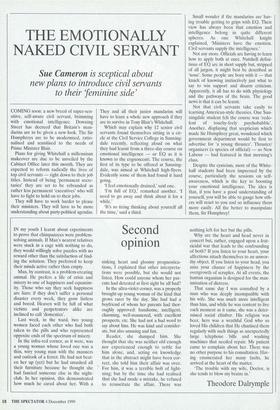Second opinion
IN my youth I learnt about experiments to prove that chimpanzees were problem- solving animals, If Man's nearest relatives were stuck in a cage with nothing to do, they would willingly solve puzzles with no reward other than the satisfaction of find- ing the solution. They preferred to keep their minds active rather than empty.
Man, by contrast, is a problem-creating animal. He prefers a life of crisis and misery to one of happiness and equanim- ity. Those who say they seek happiness are liars: if they don't suffer a personal disaster every week, they grow listless and bored. Heaven will be full of what victims and perpetrators alike are inclined to call 'domestics'.
Last week, in the ward, two young women faced each other who had both taken to the pills and who represented opposite ends of the spectrum of misery.
In the infra-red corner, as it were, was a young woman whose loved one was a thin, wiry young man with the manners and outlook of a ferret. He had not beat- en her up (yet) but he had smashed all their furniture because he thought she had fancied someone else in the night- club. In her opinion, this demonstrated how much he cared about her. With a sinking heart and gloomy prognostica- tions, I explained that other interpreta- tions were possible, but she would not listen. How could anyone whom her par- ents had detested at first sight be all bad? In the ultra-violet corner, was a properly brought-up young woman of the kind that grows rarer by the day. She had had a boyfriend of whom her parents had thor- oughly approved: handsome, intelligent, charming, well-mannered, with excellent prospects, etc. She had not a bad word to say about him. He was kind and consider- ate, but also amusing and fun.
Reader, she dumped him. She thought that she was neither old enough nor experienced enough to settle for him alone, and, acting on knowledge that in the abstract might have been cor- rect, she told him their affair was over. For him, it was a terrible bolt of light- ning; but by the time she had realised that she had made a mistake, he refused to resuscitate the affair. There was nothing left for her but the pills.
Why are the heart and head never in concert but, rather, engaged upon a frat- ricidal war that leads to the confounding of both? If you listen to your heart, your affections attach themselves to an unwor- thy object. If you listen to your head, you miss your chance of happiness by the overgrowth of scruples. At all events, the human organism is designed for the max- imisation of distress.
That same day I was consulted by a man who was deeply incompatible with his wife. She was much more intelligent than him, and while he was content to live each moment as it came, she was a deter- mined social climber. His religion was beer, hers was a wrathful God who so loved His children that He chastised them regularly with such things as unexpectedly large telephone bills and washing machines that needed repair. My patient came to complain about her. There was no other purpose to his consultation. Hav- ing enumerated her many faults, he arrived at the heart of the matter.
'The trouble with my wife, Doctor, is she tends to blow my brains in.'
Theodore Dalrymple


















































































 Previous page
Previous page